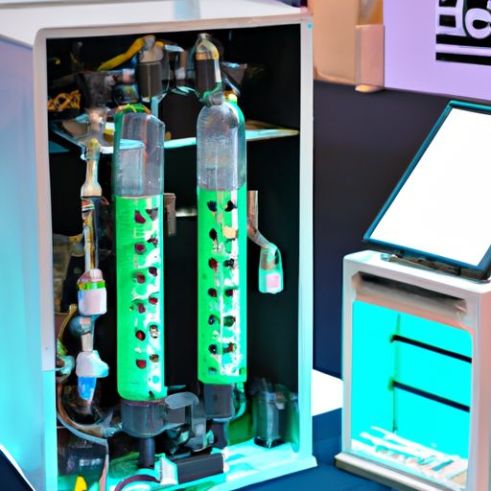Table of Contents
Water Cooled Hydrogen Fuel
 Hydrogen fuel cells have long been hailed as a promising alternative to traditional fossil fuels for powering vehicles and generating electricity. These fuel cells work by converting hydrogen gas into electricity through a chemical reaction with oxygen, producing only water and heat as byproducts. One of the key challenges in the development of hydrogen fuel cells has been managing the heat generated during the reaction, as excessive heat can reduce the efficiency and lifespan of the fuel cell.
Hydrogen fuel cells have long been hailed as a promising alternative to traditional fossil fuels for powering vehicles and generating electricity. These fuel cells work by converting hydrogen gas into electricity through a chemical reaction with oxygen, producing only water and heat as byproducts. One of the key challenges in the development of hydrogen fuel cells has been managing the heat generated during the reaction, as excessive heat can reduce the efficiency and lifespan of the fuel cell.
To address this issue, researchers have been exploring the use of water-cooled hydrogen fuel cells. These fuel cells use water as a coolant to dissipate the heat generated during the chemical reaction, helping to maintain optimal operating temperatures and improve overall efficiency. By circulating water through the fuel cell, heat is transferred away from the cell, preventing overheating and ensuring consistent performance.
Water-cooled hydrogen fuel cells offer several advantages over air-cooled systems. One of the main benefits is improved thermal management, as water has a higher heat capacity and thermal conductivity than air. This allows for more efficient heat transfer and better control of the fuel cell’s operating temperature, leading to increased efficiency and reliability. Additionally, water-cooled systems are better equipped to handle fluctuations in heat generation, providing a more stable and consistent power output.
Another advantage of water-cooled hydrogen fuel cells is their ability to operate at higher power densities. By effectively managing heat through water cooling, these fuel cells can achieve higher power outputs without compromising performance or longevity. This makes water-cooled systems ideal for applications that require high power Levels, such as electric vehicles and stationary power generation.
In addition to improved thermal management and higher power densities, water-cooled hydrogen fuel cells also offer enhanced durability and longevity. By maintaining optimal operating temperatures, water cooling helps to reduce the degradation of fuel cell components and extend the lifespan of the system. This results in lower maintenance costs and increased reliability, making water-cooled fuel cells a cost-effective and sustainable energy solution.
The development of water-cooled hydrogen fuel cells represents a significant advancement in the field of alternative energy technology. These fuel cells offer a clean and efficient way to generate electricity, with the added benefits of improved thermal management, higher power densities, and increased durability. As the demand for clean energy solutions continues to grow, water-cooled hydrogen fuel cells have the potential to play a key role in reducing greenhouse gas emissions and transitioning to a more sustainable energy future.
Overall, water-cooled hydrogen fuel cells are a promising technology that holds great potential for a wide range of applications. With their superior thermal management, high power densities, and long-term reliability, these fuel cells offer a viable alternative to traditional fossil fuels and contribute to a cleaner and more sustainable energy landscape. As research and development in this field continue to progress, water-cooled hydrogen fuel cells are poised to play a significant role in shaping the future of energy generation and consumption.
Hydrogen Fuel Cell New Technology
Hydrogen fuel cell technology has been gaining traction in recent years as a clean and efficient alternative to traditional fossil fuels. One of the latest advancements in this field is the development of water-cooled hydrogen fuel cells, which offer improved performance and durability compared to air-cooled systems.
Water-cooled hydrogen fuel cells work by using water as a coolant to regulate the temperature of the fuel cell stack. This helps to maintain optimal operating conditions and prevent overheating, which can reduce efficiency and shorten the lifespan of the fuel cell. By circulating water through the system, heat is dissipated more effectively, allowing the fuel cell to operate at higher power levels for longer periods of time.
In addition to improved thermal management, water-cooled hydrogen fuel cells also offer other benefits such as increased power density and reliability. The use of water as a coolant allows for more compact and lightweight designs, making them ideal for a wide range of applications including stationary power generation, transportation, and portable electronics. Furthermore, water-cooled fuel cells are less prone to degradation and performance loss over time, resulting in longer service life and lower maintenance costs.
Another key advantage of water-cooled hydrogen fuel cells is their ability to operate at higher temperatures without compromising performance. This is particularly important in cold weather conditions, where air-cooled systems may struggle to maintain optimal operating temperatures. By using water as a coolant, fuel cells can maintain consistent performance even in extreme environments, making them more versatile and reliable for a variety of applications.
The development of water-cooled hydrogen fuel cells represents a significant step forward in the advancement of fuel cell technology. By addressing key challenges such as thermal management and reliability, these systems offer a more efficient and sustainable alternative to traditional power generation methods. As the demand for clean energy solutions continues to grow, water-cooled fuel cells are poised to play a crucial role in meeting the world’s energy needs while reducing carbon emissions and environmental impact.
In conclusion, water-cooled hydrogen fuel cells represent a promising new technology that offers improved performance, reliability, and efficiency compared to air-cooled systems. With their ability to operate at higher temperatures, maintain consistent power output, and reduce maintenance costs, these fuel cells are well-suited for a wide range of applications in various industries. As research and development in this field continue to progress, water-cooled hydrogen fuel cells are expected to play a key role in the transition to a more sustainable and environmentally friendly energy future.
